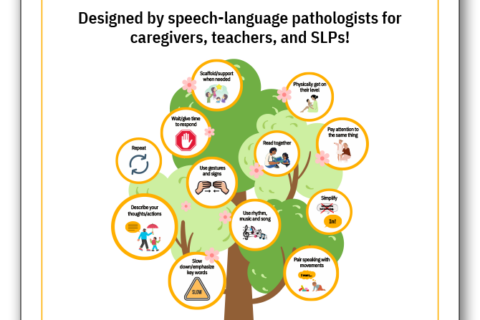Cognitive Speech Therapy for Adults

You may not think twice about picking up the phone and booking a restaurant reservation or appointment with your dentist, but, have you ever stopped to wonder about all the mental cognitive processes involved in performing these routine tasks?
Accomplishing these activities requires coordination from several different cognitive and communication skills, whether that is attention to listening and interpreting information, expressing information coherently, or planning and problem-solving. For some with cognitive impairments, these tasks are hardly routine and you may find it difficult to confidently take part in meaningful conversations because it is hard to catch important details, hold on to and process many pieces of information at once, and link and organize your thoughts to form a clear message.
This is where cognitive therapy for adults comes in. We spoke with Open Lines® founder and executive director Dr. Jessica Galgano to learn more about what cognitive therapy is and what you can expect during a therapy session.
What Is Cognitive Speech Therapy?
Cognitive skills, or our ability to think and process information, form the foundation on which communication skills are built. Cognitive communication refers to your ability to pay attention and sustain attention, recall and use information (memory), organize information, plan, problem-solve and reason, interpret things visually and through other sensory processes, and self-regulate.
“These aspects of cognition support our ability to listen, understand, and interpret spoken language; speak in an organized and cohesive manner; read; write, and take part in meaningful conversational interactions,” Dr. Galgano said.
You may benefit from therapy if you have a cognitive-communication disorder. Most often, a traumatic brain injury or a stroke causes these disorders. However, they can also result from depression, anxiety, or neurodegenerative diseases, such as Parkinson’s disease, mild cognitive impairment, or primary progressive aphasia.
The goal of cognitive speech therapy is to rebuild skills and regain confidence with communication by strengthening the cognitive skills that underpin effective communication. As cognitive-communication skills form the foundation of all communication and are impacted by several neurological and social-emotional factors, cognitive-communication therapy strategies are often integrated into treatment plans.
“All programs use core principles of neuroplasticity, which is a broadway of defining the ability of neural networks in the brain to change by growing and reorganizing,” Dr. Galgano said. “These changes range from individual neurons making new connections, to greater systematic adjustments, such as cortical remapping. Programs also use motor learning, with a combined emphasis on practice, repetition, and salience.
“This may be particularly important if you are regaining skills following a stroke or due to a neurodegenerative disease, such as Parkinson’s disease or mild cognitive impairment, and learning to strengthen skills and use strategies can be just as significant for those who are seeking to improve a stutter or public-speaking.”
Speech Therapy Cognitive Assessment
To tailor your speech therapy treatment plan, your speech-language pathologist (SLP) will take you through a series of cognitive tests to examine your attention, memory, organization, reasoning, and judgment. Together, these tests provide baseline data and help your SLP understand your strengths, needs, and goals.
Your SLP will consider your medical history, strengths and weaknesses from the evaluation process, and responsiveness to therapy techniques. They will also consider other factors, such as how much these cognitive-communication difficulties may affect your ability to work, interact with important people in your life, and/or carry out daily activities.
Specialists then develop a plan of tailored exercises that target identified goals while incorporating different treatment techniques.
“Not only do people practice these skills in a professional setting, they also train to incorporate them as part of a daily home exercise routine so gains made in therapy will be generalized to all aspects of one’s day-to-day life,” Dr. Galgano said. “The end goal is to transfer skills learned in the intensive program or speech therapy to one’s career, personal life, and favorite hobbies.”
How to Prevent Cognitive Decline
Cognitive communication disorders do not have to define you. Therapeutic treatments exist to help you improve your ability to communicate while also preventing further cognitive decline. Doing nothing will only hinder progress.
By supporting cognitive aspects of communication, such as attention, memory, problem-solving, and reasoning skills, you are better equipped to listen, understand, and interpret spoken and written language; speak in an organized and cohesive manner, and take part in meaningful dialogue. Ultimately, this increases confidence in social situations, when communicating at work or school, managing information, and problem-solving.
To help improve cognition, treatment may include a combination of environmental modifications, drill-based exercises, and functional activities. Treatment should also be intensive, as research has shown that people make the greatest improvements when they participate in an intensive program that is every day compared to two or three times per week for an hour.
“Environmental modifications may include using visual calendars and graphic organizers to support attention, visual interpretation of information, organization, and planning,” Dr. Galgano explained. “Exercises such as visualization techniques may help increase attention and memory. You may also take part in functional activities such as role-play conversations or the preparation of functional tasks that can help you regain your confidence with your professional and personal responsibilities.
Motivation and intensity of practice are factors that most significantly affect how quickly you see results in an individual program. Other factors include specific goals (for example, returning to life in retirement versus regaining skills for the workplace as an attorney), the extent of the neurological injury, and feelings or beliefs about communication difficulties.
“Stress and frustration can often exacerbate many cognitive and communication problems, so it is important to stick with the treatment routine,” Dr. Galgano said. “A speech-language pathologist will provide counseling, support, and individualized training to help increase confidence with communication and the ability to manage the impact anxiety and emotions, such as anger or frustration, can have on your ability to think and speak.”
For example, a post-stroke patient can significantly improve in one month by participating in an intensive speech program five times a week for one to four hours a day. This also includes working independently, outside of treatment sessions, within an individualized home exercise program. The intensive program can be renewed on a monthly basis until you meet and exceed your goals.
If you’re struggling with communication difficulties, it’s time to turn to Open Lines®. Contact us via phone (212-430-6800), email [email protected], or by filling out our convenient contact form. Improve your communication skills and unlock your potential with Open Lines® Speech and Communication in New York today!
Get in Touch With Open Lines®














